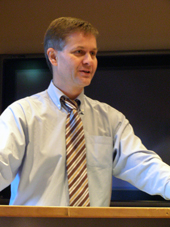| |
|
 |
It's time to ask faiths to be partners: major donors say
November 16, 2006:
 |
 |
 |
Religious leaders: "speak to people's hearts in ways that politicians can only dream of." Erik Solheim: Minister for International Development, Norway |
Last week Oslo hosted a historic meeting between major “donor countries”, faith representatives and international agencies such as the World Bank, UNDP, and UNICEF.
Download all the papers from the Oslo meeting here.
The meeting, brokered by ARC working with the Norwegian Government, is a critical early step in increasing the impact of faiths in tackling climate change, poverty and other key current issues.
It was called in order to address the problem of why faith communities are not automatically thought of as valid civil society partners in development and environment initiatives – and to think creatively about how to tackle that.
 |
 |
 |
Environment is going to be the number one issue for many development ministries around the world next year. |
A remarkable consensus emerged, focused around the desire that in future faiths should always be thought of as partners, alongside other sectors of civil society in all such endeavours and initiatives around the world.
“Environment is a huge issue which will affect everyone: and those who are living on the margins might be pushed off the edge,” said Erik Solheim, Norway’s Minister for International Development. “Religious leaders have a unique opportunity to lead change on this. In every religion, nature is either in itself God, or it is given by God or it is a creation of God.”
There were three key reasons that Mr Solheim had decided to pioneer Norway’s work with religions on development issues, he said. The first is that they provide moral leadership: “they speak to people’s hearts in ways that politicians can only dream of.” The second is that they are usually extremely well-organised. And the third is because effective development is partly dependent on people’s sense of their own identity: that they should be people joined through their communities rather than divided through their nationalities, languages, race or religion. And religious leaders have a major role in helping that happen.
The next stage has been defined as creating a set of principles which would underpin such partnerships, as well as producing books and resources describing and exploring the vast range of environmentally-based projects organised by and with the faiths around the world.
“Something must happen after this conference,” said Delphin Ganapin, Global Manager, UNDP Small Grants Programme.
Rick Scobey from the World Bank agreed – and came up with a detailed proposal on how to proceed, including sponsoring research on successful stories and examples, working with religions (and their moral guidance) on tackling the two scourges of development – conflict and corruption – and making it a norm to invite religions to the table. Not just in their NGO incarnations, like Caritas or Christian Aid, but as religious organisations in their own right.
For example the World Bank is sponsoring a new global forestry alliance. “Sitting here it occurs to me that we should be inviting the faiths,” Mr Scobey said.
“This has been a very touch area for ARC to work on,” admitted ARC’s Secretary General Martin Palmer. “But it is one that has deeply concerned us. Up till now it has appeared to many people in the activist religious world that there has been an unthinking dismissal of the contribution of the faiths in development and environment. However, from this meeting it is now clear that the huge scale of work that the faiths have already been undertaking in these areas has to become part and parcel of the international work for sustainable development and respect for creation.”
LINK here for speaking notes by Most.Rev. Diarmuid Martin, Archbishop of Dublin.
|
 |
 |
|
|
|
|
|
 |
Norway Process
In November 2006 the Norwegian government is working with ARC, UNDP and the World Bank to host an important conference on Religion, Environment and Development: the Potential for Partnership. It was the first step in a process to find a workable way for religions to work with governments on international development. |
 |
November 16 2006:
Archbishop of Dublin explains role of faiths in development
"Development will only be sustainable when it generates voice, ownership and relations that are harmonious and responsible." Archbishop Diarmuid Martin: Oslo, November 2006.
|
 |
ARC at a glance
ARC is a secular body that helps the major religions of the world to develop their own environmental programmes, based on their own core teachings, beliefs and practices. |
 |
 |
|
|

